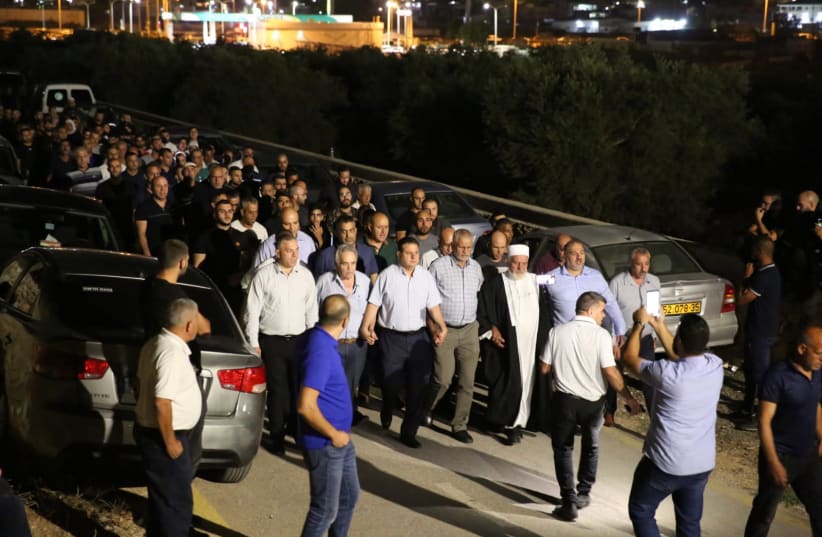During the meeting, protesters called on the Arab politicians to assume responsibility for the surge in the violent crime and submit their resignations. They also accused the authorities, including the government and police, of “negligence.”At least 71 Arab citizens have been killed in a spate of criminal activity since the beginning of this year. A similar number of Arab citizens were killed during 2018.The general strike will include all schools and educational institutions in the Arab sector.“The situation in the Arab sector has become intolerable,” Majd al-Krum Mayor Salim Slaibi said during the meeting. “We want the leaders of our community to take serious measures to stop the bloodshed. We can’t continue to live in fear.”Former MK Mohammed Barakeh, head of the High Follow-Up Committee for Arab Citizens of Israel, described the situation as “disastrous.” He said that it would be a “second disaster” if the Arab citizens limited their reaction to mere condemnations.“We need to defend ourselves,” Barakeh said. “We need to defend our society.”Barakeh, former head of the Hadash Party, accused the Israeli establishment of “being in collusion with crime.” The Israeli government, he said, is “directly responsible for each crime” in the Arab sector.He pointed out that 1,380 Arabs have been killed since 2000. “The issue of crime [in the Arab sector] is at the top of our list of priorities,” Barakeh added. “We hold the [Israeli] authorities responsible; however, we also bear responsibility. But we don’t have the authority to confiscate [illegal] weapons or indict the criminals. This is the job of the State.”Addressing the meeting, head of the Joint List MK Ayman Odeh said that “70% of the solution to the problem of crime [in the Arab sector] lies in the hands of the Israeli authorities, while the Arabs are 30% responsible. We blame the Israeli government. We hold [Prime Minister Benjamin] Netanyahu and [Minister of Public Security Gilad] Erdan responsible.”He said that the No. 1 concern of the Arab citizens now was how to force the authorities to carry out their duties in combating crime.“The Israeli establishment is treating us with racism and is lying to us,” Odeh charged. “We need to take unprecedented measures until we force the authorities to acknowledge the gravity of the situation.”He and other leaders called on Arab citizens to take to the streets on Thursday to protest the wave of violent crime.“We will close main highways,” Odeh said. “This is the only way to bring about real change.”Joint List MK Ahmed Tibi accused the police of treating Arab-Israelis as “enemies.” He said that the 13 members of the Joint List would boycott the Knesset’s inauguration session, scheduled for Thursday, in compliance with the general strike in the Arab sector.Tibi called for presenting the government and police with an “emergency plan” for combating all forms of crime among Arab-Israelis, adding that the violence posed a threat to “our social fabric.” He said that there were two forms of crime in the Arab sector: “violence and organized crime, and gangs.”The problem the Arab citizens are facing, Tibi added, is with “the mafias and gangs. Violence exists in every society. Organized crime used to exist in some Israeli cities, such as Netanya and Nahariya.The Israel Police proved that they are strong and professional, and eliminated the crime in these two cities. Why? Because a decision was taken by the highest echelons of power. Therefore, we are demanding an emergency plan for uprooting crime in the Arab sector.”Several people who attended the meeting accused the Arab MKs and heads of the High Follow-Up Committee for Arab Citizens of Israel of failing their constituents, and called on them to resign.Anwar Manna, a relative of the brothers shot dead on Tuesday in Majd al-Krum, shouted at the Arab leaders: “We are fed up with you. We are disgusted with all your decisions. All your talk is nonsense. Our children are being killed on the streets; what have you done for us?”Maha Manna, another relative of the victims, called for the resignation of the Arab MKs and for declaring a “state of emergency” in the Arab sector in the wake of the wave of violent crime.“We no longer feel safe walking on the streets,” she said. “Declaring a general strike is not enough. The leaders should resign. We need to bring our plight to the attention of the international community. We are facing genocide. We are facing slow death.”Mbada Farhat, a journalist from Majd al-Krum, said that the Arab citizens want “immediate solutions” to violent crime. He and other residents said that the police were not doing enough to tackle increased crime.“It’s inconceivable that the State knows what’s happening in Iran and elsewhere, while its police don’t know where the illegal weapons are,” he said.Meanwhile, a number of Arab-Israeli lawyers announced on Wednesday that they would not represent anyone suspected of possession of illegal weapons. They said that the move was in the context of efforts to combat rampant crime in the Arab sector.Abdel Baset Qais, mayor of the Galilee town of Nahf, accused the police of “negligence” in dealing with violent crime among Arab Israelis. Qais said that unidentified assailants attacked his home with explosive devices two months ago, and on Tuesday, his car was the target of a shooting attack.“It’s time for the police to take serious action,” the mayor said. “We also need to be united in the war on crime.”تظاهرة في مجد الكروم احتجاجاً على استمرار جرائم القتل في الداخل المحتل، واخرها مقتل شقيقين يوم أمس. pic.twitter.com/YNEC44ejvp
— شبكة قدس الإخبارية (@qudsn) October 2, 2019
Arab Israelis declare general strike to protest surge in violent crime
Protesters accuse police, Arab leaders of "negligence."
